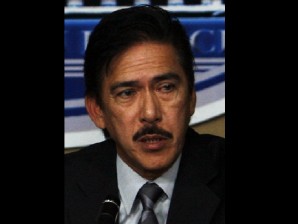MANILA, Philippines—The Senate impeachment court has to seriously weigh the pros and cons of inviting Associate Justice Ma. Lourdes Sereno lest it be accused of engaging in a “fishing expedition,” Majority Leader Vicente Sotto III said on Saturday.
“Is it a legal thing to do? Second, is it proper? If she volunteers, why do we need to send an invitation? What worries me is that we might be contributing to the criticism that we are on a fishing expedition,” Sotto said in an interview.
In legal dictionaries, a “fishing expedition” is dismissed as a speculative quest for information, an “examination for discovery” which may enable a lawyer “to make a case of which he has no knowledge at present.” It is associated with the reckless filing of cases and prosecutorial misconduct.
Risk being embarrassed
Added Sotto: Besides, the Senate also doesn’t want to risk “being embarrassed if we decide to issue the invitation, and the Supreme Court en banc rejects it.”
The prosecution’s request to invite Sereno to appear at the trial in connection with the 7th article of impeachment, and Sen. Antonio Trillanes IV’s motion to send “interrogatories” or a list of preliminary questions to the associate justice, needs to be seriously discussed by the senators in Monday’s caucus, Sotto said.
Article 7 accuses Corona of betrayal of the public trust for allegedly granting a temporary restraining order (TRO) against the travel ban on former President Gloria Macapagal-Arroyo.
The court had earlier ruled as “hearsay” Justice Secretary Leila de Lima’s testimony on supposed irregularities cited by Sereno in her dissenting opinion on the Nov. 15, 2011, TRO issued by the Supreme Court.
The prosecution, which is expected to submit a pleading on the request, said Sereno would testify only on relevant matters and not touch on confidential matters in view of the rulings by the impeachment court and the SC against compelling magistrates to testify at the trial.
In Sen. Gregorio Honasan’s view, Sereno’s testimony would be helpful but “not crucial in the sense that her opinion is a dissenting opinion.”
“Let’s not clutter the evidentiary space with too many technicalities and legalities… Being a collegial and consensual body, the Supreme Court makes a ruling based on the opinion of the majority,” he said in a phone interview.
“To make the issue hang on the single information of a dissenting opinion by an associate justice who expressed a minority view is cutting it too thin,” he added.
Compliance with rules
An invitation for Sereno to appear at the trial has to comply with the rules of both the impeachment court and the high court. And if this is rejected by the high tribunal, the impeachment court should not push it, Honasan said.
“We can’t clash on this. The Senate and the Supreme Court have been behaving very well, in statesman-like fashion.”
Sen. Francis Pangilinan, on the other hand, argued that judicial privilege should not get in the way of the impeachment court’s mandate to try Corona’s case.
“Judicial privilege exists, yes, but it cannot be invoked to cover up wrongdoing nor can it be invoked to undermine or defeat the constitutional mandate of the Senate having sole power to try and decide impeachment cases,” he said in a text message.
Pangilinan said the impeachment court should assert its “supremacy” over the Supreme Court in terms of exercising exclusive jurisdiction of the impeachment trial.
“How can they explain this anomalous situation wherein we need to secure the consent of the court for witnesses to appear before us in a trial wherein the chief justice himself is being tried?” he said.
But Bayan Muna party-list Rep. Neri Javier Colmenares said that submitting written questions to Sereno in lieu of a personal appearance in the impeachment trial of Renato Corona “might not be enough.”
Colmenares, lead prosecutor for Article 7 of the impeachment complaint, insisted that the Senate impeachment court invite Sereno to testify on her dissenting opinion on the high court’s order restraining the Department of Justice from implementing its hold-departure order on Arroyo.
“(But) what we need is for Justice Sereno to be at least invited to the impeachment trial or at most subpoenaed, so that we may find closure on the issue of Chief Justice Corona’s partiality to Gloria Macapagal-Arroyo,” he said.
It was Trillanes who broached the idea of sending interrogatories to Sereno in the event the Supreme Court en banc disallowed the justice’s appearance at the impeachment trial.
Interrogatories are a formal set of written questions propounded by one litigant and required to be answered by an adversary or a witness in order to clarify matters of fact and help to determine in advance what facts will be presented at trial.
Heed the people’s cry
Colmenares appealed to Sereno to heed the “people’s cry for the truth” that only she could shed light on.
Meanwhile, it was the prosecution’s turn to appeal to the senator-judges not to prejudge the case against Corona in the media.
Marikina Rep. Romero Quimbo, a spokesperson for the prosecution, said that while the prosecutors respected the opinions of the senator-judges, they should also be reminded that they should remain impartial and make an appropriate judgement at the right time.
“The time to make a decision or render a judgement is not now. The time to do that is at the end of the trial and I hope that much as we are always advised to do certain things, I think we are also free to remind the senator-judges to also put their judgement on hold,” said Quimbo.
The prosecutors have repeatedly been scolded by some senators for their use of the media and the trial itself supposedly to push their political agendas, often deviating from the specific articles of impeachment. With a report from Cynthia D. Balana
